Pre-school Class Schedule - Analysis and Recommendations
VerifiedAdded on 2023/04/24
|8
|1951
|204
AI Summary
The purpose of the essay is to recommend a Pre-school Class schedule and analyse whether the schedule is designed following the early childhood philosophies, needs of the children, need for balanced activities, needs of parents and other parameters related to learning and development of pre-school children.
Contribute Materials
Your contribution can guide someone’s learning journey. Share your
documents today.
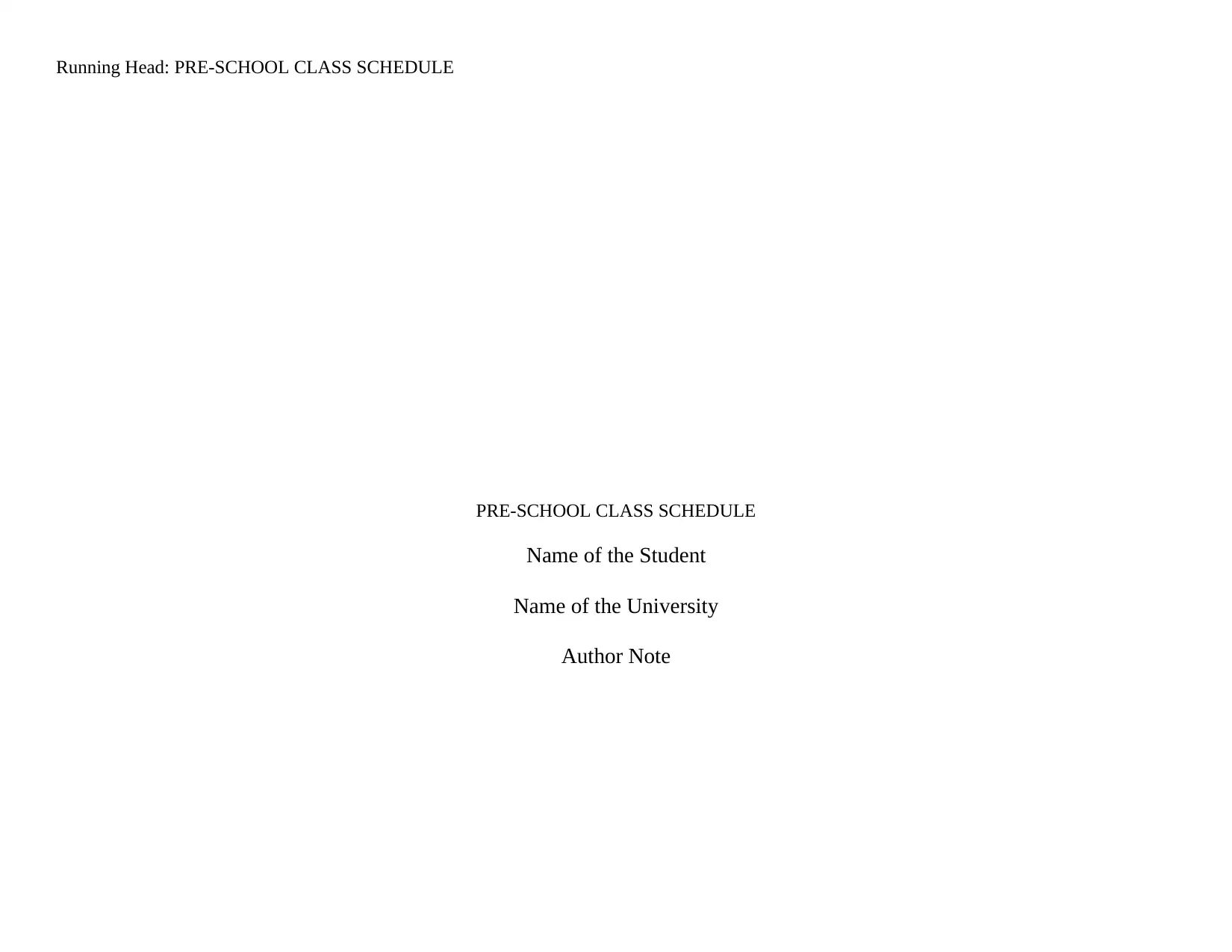
Running Head: PRE-SCHOOL CLASS SCHEDULE
PRE-SCHOOL CLASS SCHEDULE
Name of the Student
Name of the University
Author Note
PRE-SCHOOL CLASS SCHEDULE
Name of the Student
Name of the University
Author Note
Secure Best Marks with AI Grader
Need help grading? Try our AI Grader for instant feedback on your assignments.
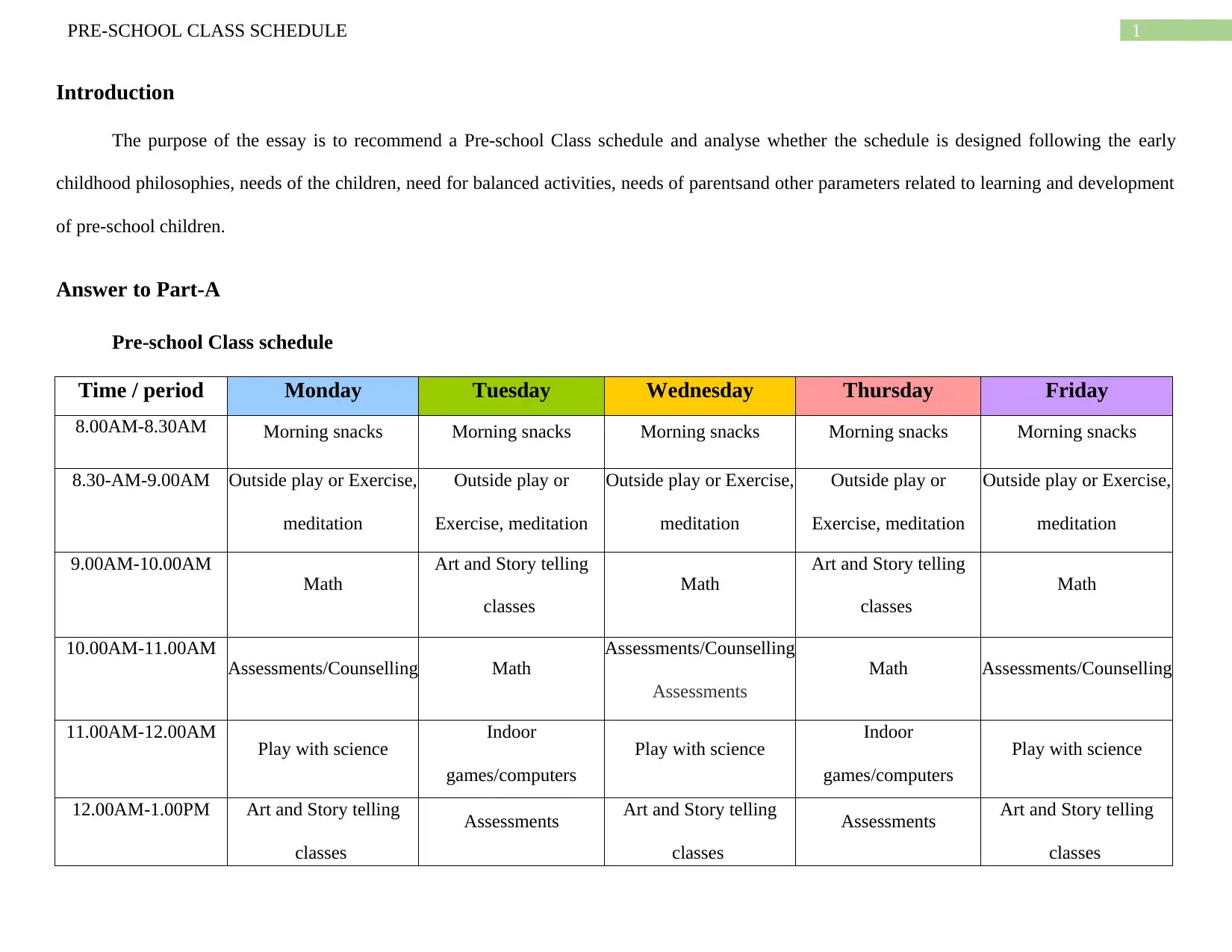
1PRE-SCHOOL CLASS SCHEDULE
Introduction
The purpose of the essay is to recommend a Pre-school Class schedule and analyse whether the schedule is designed following the early
childhood philosophies, needs of the children, need for balanced activities, needs of parentsand other parameters related to learning and development
of pre-school children.
Answer to Part-A
Pre-school Class schedule
Time / period Monday Tuesday Wednesday Thursday Friday
8.00AM-8.30AM Morning snacks Morning snacks Morning snacks Morning snacks Morning snacks
8.30-AM-9.00AM Outside play or Exercise,
meditation
Outside play or
Exercise, meditation
Outside play or Exercise,
meditation
Outside play or
Exercise, meditation
Outside play or Exercise,
meditation
9.00AM-10.00AM
Math
Art and Story telling
classes
Math
Art and Story telling
classes
Math
10.00AM-11.00AM
Assessments/Counselling Math
Assessments/Counselling
Assessments
Math Assessments/Counselling
11.00AM-12.00AM Play with science Indoor
games/computers
Play with science Indoor
games/computers
Play with science
12.00AM-1.00PM Art and Story telling
classes
Assessments Art and Story telling
classes
Assessments Art and Story telling
classes
Introduction
The purpose of the essay is to recommend a Pre-school Class schedule and analyse whether the schedule is designed following the early
childhood philosophies, needs of the children, need for balanced activities, needs of parentsand other parameters related to learning and development
of pre-school children.
Answer to Part-A
Pre-school Class schedule
Time / period Monday Tuesday Wednesday Thursday Friday
8.00AM-8.30AM Morning snacks Morning snacks Morning snacks Morning snacks Morning snacks
8.30-AM-9.00AM Outside play or Exercise,
meditation
Outside play or
Exercise, meditation
Outside play or Exercise,
meditation
Outside play or
Exercise, meditation
Outside play or Exercise,
meditation
9.00AM-10.00AM
Math
Art and Story telling
classes
Math
Art and Story telling
classes
Math
10.00AM-11.00AM
Assessments/Counselling Math
Assessments/Counselling
Assessments
Math Assessments/Counselling
11.00AM-12.00AM Play with science Indoor
games/computers
Play with science Indoor
games/computers
Play with science
12.00AM-1.00PM Art and Story telling
classes
Assessments Art and Story telling
classes
Assessments Art and Story telling
classes
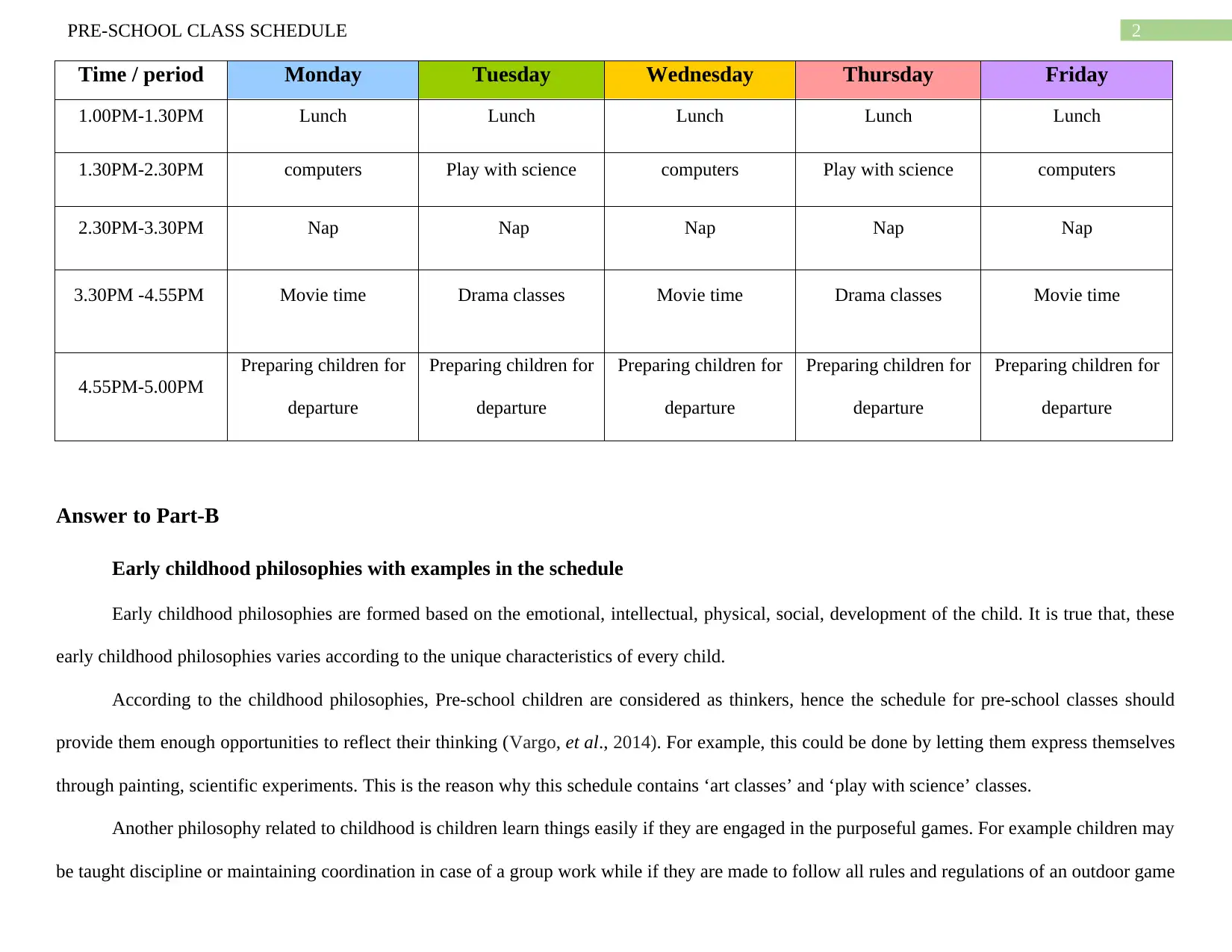
2PRE-SCHOOL CLASS SCHEDULE
Time / period Monday Tuesday Wednesday Thursday Friday
1.00PM-1.30PM Lunch Lunch Lunch Lunch Lunch
1.30PM-2.30PM computers Play with science computers Play with science computers
2.30PM-3.30PM Nap Nap Nap Nap Nap
3.30PM -4.55PM Movie time Drama classes Movie time Drama classes Movie time
4.55PM-5.00PM
Preparing children for
departure
Preparing children for
departure
Preparing children for
departure
Preparing children for
departure
Preparing children for
departure
Answer to Part-B
Early childhood philosophies with examples in the schedule
Early childhood philosophies are formed based on the emotional, intellectual, physical, social, development of the child. It is true that, these
early childhood philosophies varies according to the unique characteristics of every child.
According to the childhood philosophies, Pre-school children are considered as thinkers, hence the schedule for pre-school classes should
provide them enough opportunities to reflect their thinking (Vargo, et al., 2014). For example, this could be done by letting them express themselves
through painting, scientific experiments. This is the reason why this schedule contains ‘art classes’ and ‘play with science’ classes.
Another philosophy related to childhood is children learn things easily if they are engaged in the purposeful games. For example children may
be taught discipline or maintaining coordination in case of a group work while if they are made to follow all rules and regulations of an outdoor game
Time / period Monday Tuesday Wednesday Thursday Friday
1.00PM-1.30PM Lunch Lunch Lunch Lunch Lunch
1.30PM-2.30PM computers Play with science computers Play with science computers
2.30PM-3.30PM Nap Nap Nap Nap Nap
3.30PM -4.55PM Movie time Drama classes Movie time Drama classes Movie time
4.55PM-5.00PM
Preparing children for
departure
Preparing children for
departure
Preparing children for
departure
Preparing children for
departure
Preparing children for
departure
Answer to Part-B
Early childhood philosophies with examples in the schedule
Early childhood philosophies are formed based on the emotional, intellectual, physical, social, development of the child. It is true that, these
early childhood philosophies varies according to the unique characteristics of every child.
According to the childhood philosophies, Pre-school children are considered as thinkers, hence the schedule for pre-school classes should
provide them enough opportunities to reflect their thinking (Vargo, et al., 2014). For example, this could be done by letting them express themselves
through painting, scientific experiments. This is the reason why this schedule contains ‘art classes’ and ‘play with science’ classes.
Another philosophy related to childhood is children learn things easily if they are engaged in the purposeful games. For example children may
be taught discipline or maintaining coordination in case of a group work while if they are made to follow all rules and regulations of an outdoor game
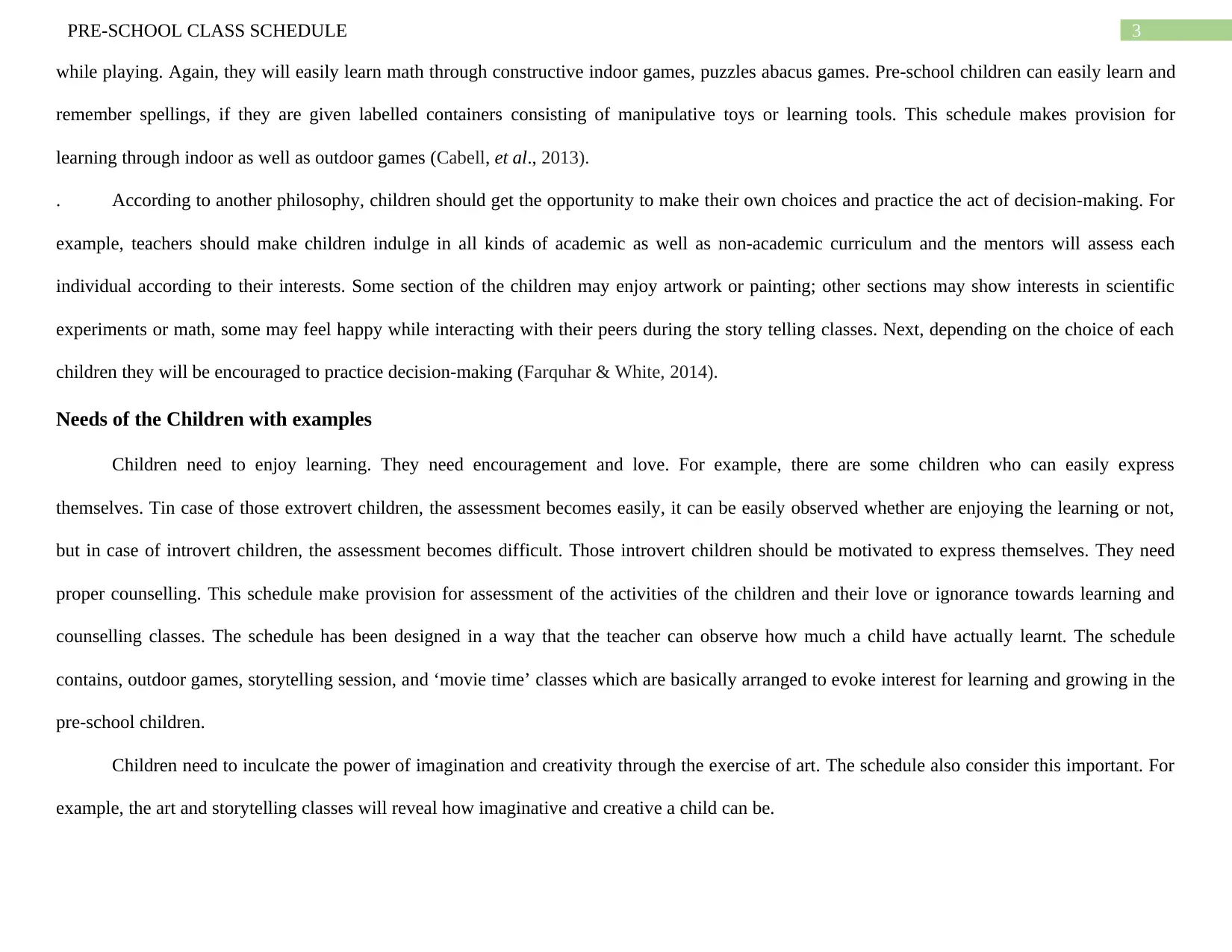
3PRE-SCHOOL CLASS SCHEDULE
while playing. Again, they will easily learn math through constructive indoor games, puzzles abacus games. Pre-school children can easily learn and
remember spellings, if they are given labelled containers consisting of manipulative toys or learning tools. This schedule makes provision for
learning through indoor as well as outdoor games (Cabell, et al., 2013).
. According to another philosophy, children should get the opportunity to make their own choices and practice the act of decision-making. For
example, teachers should make children indulge in all kinds of academic as well as non-academic curriculum and the mentors will assess each
individual according to their interests. Some section of the children may enjoy artwork or painting; other sections may show interests in scientific
experiments or math, some may feel happy while interacting with their peers during the story telling classes. Next, depending on the choice of each
children they will be encouraged to practice decision-making (Farquhar & White, 2014).
Needs of the Children with examples
Children need to enjoy learning. They need encouragement and love. For example, there are some children who can easily express
themselves. Tin case of those extrovert children, the assessment becomes easily, it can be easily observed whether are enjoying the learning or not,
but in case of introvert children, the assessment becomes difficult. Those introvert children should be motivated to express themselves. They need
proper counselling. This schedule make provision for assessment of the activities of the children and their love or ignorance towards learning and
counselling classes. The schedule has been designed in a way that the teacher can observe how much a child have actually learnt. The schedule
contains, outdoor games, storytelling session, and ‘movie time’ classes which are basically arranged to evoke interest for learning and growing in the
pre-school children.
Children need to inculcate the power of imagination and creativity through the exercise of art. The schedule also consider this important. For
example, the art and storytelling classes will reveal how imaginative and creative a child can be.
while playing. Again, they will easily learn math through constructive indoor games, puzzles abacus games. Pre-school children can easily learn and
remember spellings, if they are given labelled containers consisting of manipulative toys or learning tools. This schedule makes provision for
learning through indoor as well as outdoor games (Cabell, et al., 2013).
. According to another philosophy, children should get the opportunity to make their own choices and practice the act of decision-making. For
example, teachers should make children indulge in all kinds of academic as well as non-academic curriculum and the mentors will assess each
individual according to their interests. Some section of the children may enjoy artwork or painting; other sections may show interests in scientific
experiments or math, some may feel happy while interacting with their peers during the story telling classes. Next, depending on the choice of each
children they will be encouraged to practice decision-making (Farquhar & White, 2014).
Needs of the Children with examples
Children need to enjoy learning. They need encouragement and love. For example, there are some children who can easily express
themselves. Tin case of those extrovert children, the assessment becomes easily, it can be easily observed whether are enjoying the learning or not,
but in case of introvert children, the assessment becomes difficult. Those introvert children should be motivated to express themselves. They need
proper counselling. This schedule make provision for assessment of the activities of the children and their love or ignorance towards learning and
counselling classes. The schedule has been designed in a way that the teacher can observe how much a child have actually learnt. The schedule
contains, outdoor games, storytelling session, and ‘movie time’ classes which are basically arranged to evoke interest for learning and growing in the
pre-school children.
Children need to inculcate the power of imagination and creativity through the exercise of art. The schedule also consider this important. For
example, the art and storytelling classes will reveal how imaginative and creative a child can be.
Secure Best Marks with AI Grader
Need help grading? Try our AI Grader for instant feedback on your assignments.
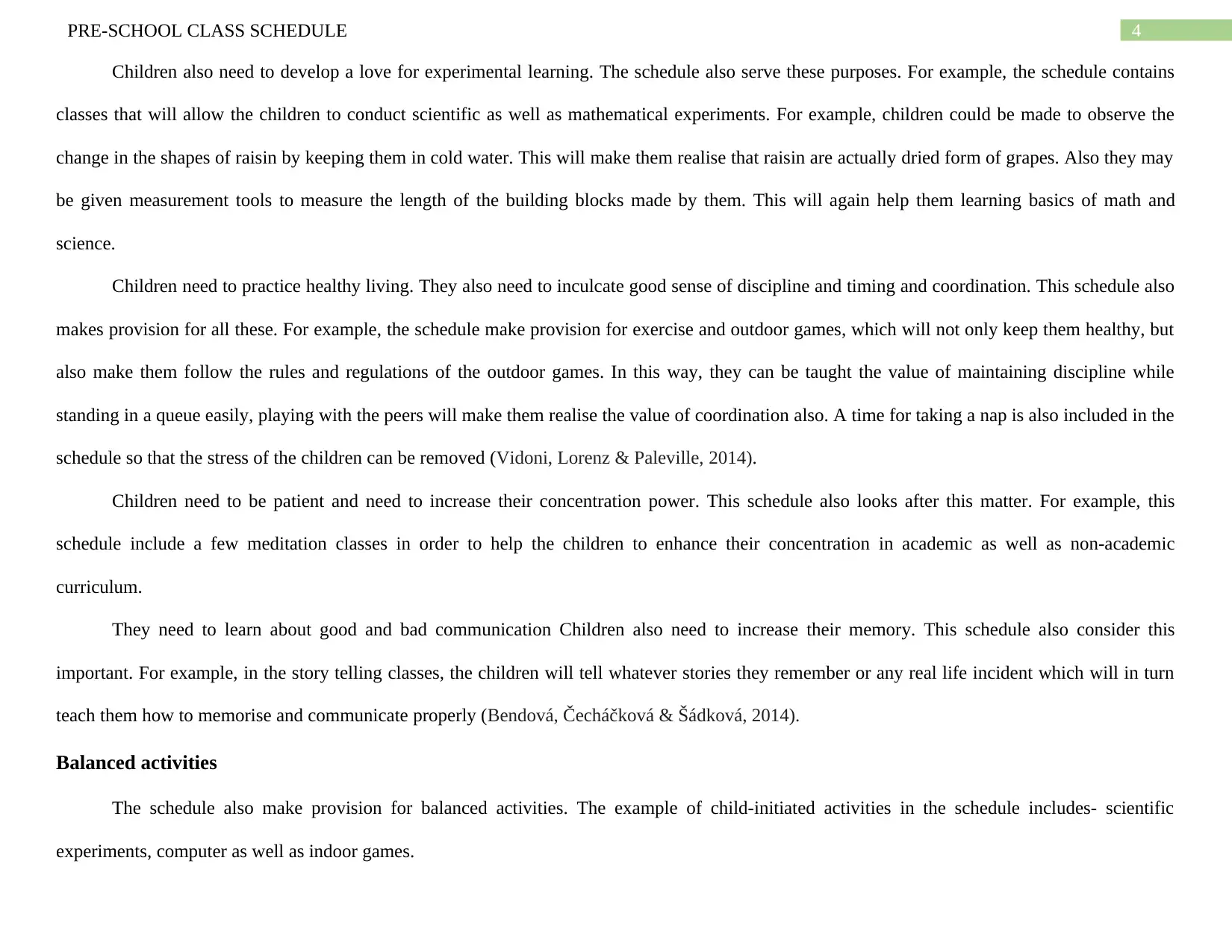
4PRE-SCHOOL CLASS SCHEDULE
Children also need to develop a love for experimental learning. The schedule also serve these purposes. For example, the schedule contains
classes that will allow the children to conduct scientific as well as mathematical experiments. For example, children could be made to observe the
change in the shapes of raisin by keeping them in cold water. This will make them realise that raisin are actually dried form of grapes. Also they may
be given measurement tools to measure the length of the building blocks made by them. This will again help them learning basics of math and
science.
Children need to practice healthy living. They also need to inculcate good sense of discipline and timing and coordination. This schedule also
makes provision for all these. For example, the schedule make provision for exercise and outdoor games, which will not only keep them healthy, but
also make them follow the rules and regulations of the outdoor games. In this way, they can be taught the value of maintaining discipline while
standing in a queue easily, playing with the peers will make them realise the value of coordination also. A time for taking a nap is also included in the
schedule so that the stress of the children can be removed (Vidoni, Lorenz & Paleville, 2014).
Children need to be patient and need to increase their concentration power. This schedule also looks after this matter. For example, this
schedule include a few meditation classes in order to help the children to enhance their concentration in academic as well as non-academic
curriculum.
They need to learn about good and bad communication Children also need to increase their memory. This schedule also consider this
important. For example, in the story telling classes, the children will tell whatever stories they remember or any real life incident which will in turn
teach them how to memorise and communicate properly (Bendová, Čecháčková & Šádková, 2014).
Balanced activities
The schedule also make provision for balanced activities. The example of child-initiated activities in the schedule includes- scientific
experiments, computer as well as indoor games.
Children also need to develop a love for experimental learning. The schedule also serve these purposes. For example, the schedule contains
classes that will allow the children to conduct scientific as well as mathematical experiments. For example, children could be made to observe the
change in the shapes of raisin by keeping them in cold water. This will make them realise that raisin are actually dried form of grapes. Also they may
be given measurement tools to measure the length of the building blocks made by them. This will again help them learning basics of math and
science.
Children need to practice healthy living. They also need to inculcate good sense of discipline and timing and coordination. This schedule also
makes provision for all these. For example, the schedule make provision for exercise and outdoor games, which will not only keep them healthy, but
also make them follow the rules and regulations of the outdoor games. In this way, they can be taught the value of maintaining discipline while
standing in a queue easily, playing with the peers will make them realise the value of coordination also. A time for taking a nap is also included in the
schedule so that the stress of the children can be removed (Vidoni, Lorenz & Paleville, 2014).
Children need to be patient and need to increase their concentration power. This schedule also looks after this matter. For example, this
schedule include a few meditation classes in order to help the children to enhance their concentration in academic as well as non-academic
curriculum.
They need to learn about good and bad communication Children also need to increase their memory. This schedule also consider this
important. For example, in the story telling classes, the children will tell whatever stories they remember or any real life incident which will in turn
teach them how to memorise and communicate properly (Bendová, Čecháčková & Šádková, 2014).
Balanced activities
The schedule also make provision for balanced activities. The example of child-initiated activities in the schedule includes- scientific
experiments, computer as well as indoor games.
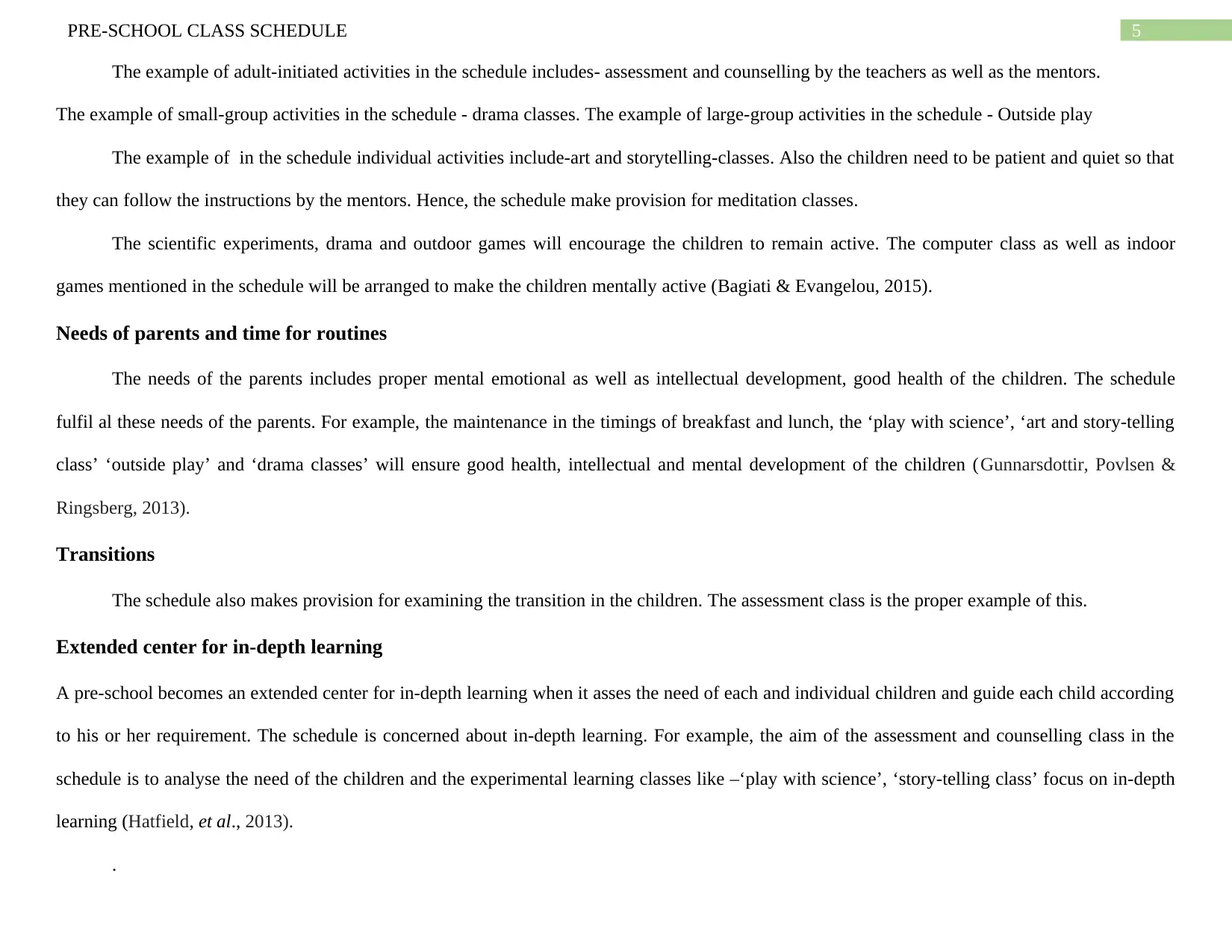
5PRE-SCHOOL CLASS SCHEDULE
The example of adult-initiated activities in the schedule includes- assessment and counselling by the teachers as well as the mentors.
The example of small-group activities in the schedule - drama classes. The example of large-group activities in the schedule - Outside play
The example of in the schedule individual activities include-art and storytelling-classes. Also the children need to be patient and quiet so that
they can follow the instructions by the mentors. Hence, the schedule make provision for meditation classes.
The scientific experiments, drama and outdoor games will encourage the children to remain active. The computer class as well as indoor
games mentioned in the schedule will be arranged to make the children mentally active (Bagiati & Evangelou, 2015).
Needs of parents and time for routines
The needs of the parents includes proper mental emotional as well as intellectual development, good health of the children. The schedule
fulfil al these needs of the parents. For example, the maintenance in the timings of breakfast and lunch, the ‘play with science’, ‘art and story-telling
class’ ‘outside play’ and ‘drama classes’ will ensure good health, intellectual and mental development of the children (Gunnarsdottir, Povlsen &
Ringsberg, 2013).
Transitions
The schedule also makes provision for examining the transition in the children. The assessment class is the proper example of this.
Extended center for in-depth learning
A pre-school becomes an extended center for in-depth learning when it asses the need of each and individual children and guide each child according
to his or her requirement. The schedule is concerned about in-depth learning. For example, the aim of the assessment and counselling class in the
schedule is to analyse the need of the children and the experimental learning classes like –‘play with science’, ‘story-telling class’ focus on in-depth
learning (Hatfield, et al., 2013).
.
The example of adult-initiated activities in the schedule includes- assessment and counselling by the teachers as well as the mentors.
The example of small-group activities in the schedule - drama classes. The example of large-group activities in the schedule - Outside play
The example of in the schedule individual activities include-art and storytelling-classes. Also the children need to be patient and quiet so that
they can follow the instructions by the mentors. Hence, the schedule make provision for meditation classes.
The scientific experiments, drama and outdoor games will encourage the children to remain active. The computer class as well as indoor
games mentioned in the schedule will be arranged to make the children mentally active (Bagiati & Evangelou, 2015).
Needs of parents and time for routines
The needs of the parents includes proper mental emotional as well as intellectual development, good health of the children. The schedule
fulfil al these needs of the parents. For example, the maintenance in the timings of breakfast and lunch, the ‘play with science’, ‘art and story-telling
class’ ‘outside play’ and ‘drama classes’ will ensure good health, intellectual and mental development of the children (Gunnarsdottir, Povlsen &
Ringsberg, 2013).
Transitions
The schedule also makes provision for examining the transition in the children. The assessment class is the proper example of this.
Extended center for in-depth learning
A pre-school becomes an extended center for in-depth learning when it asses the need of each and individual children and guide each child according
to his or her requirement. The schedule is concerned about in-depth learning. For example, the aim of the assessment and counselling class in the
schedule is to analyse the need of the children and the experimental learning classes like –‘play with science’, ‘story-telling class’ focus on in-depth
learning (Hatfield, et al., 2013).
.
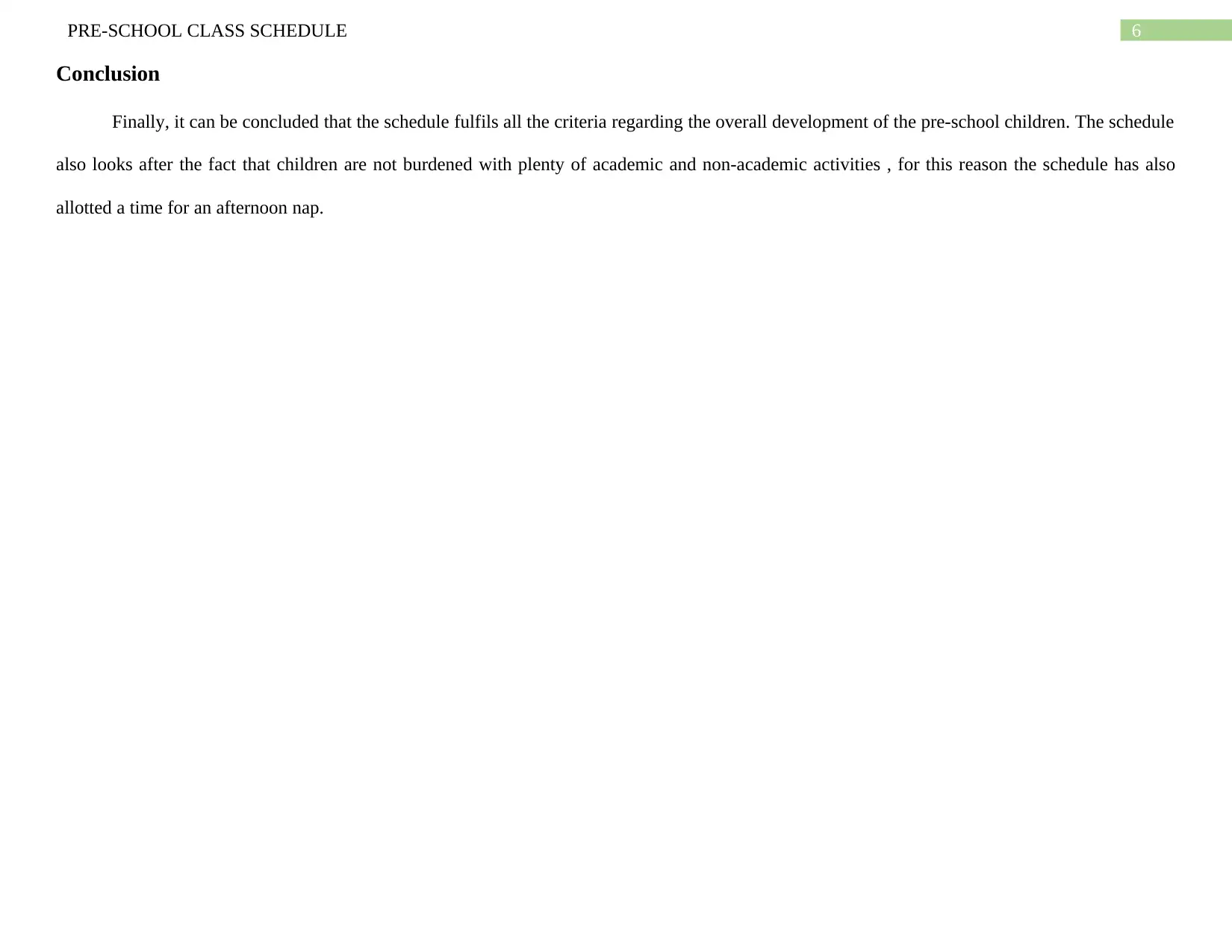
6PRE-SCHOOL CLASS SCHEDULE
Conclusion
Finally, it can be concluded that the schedule fulfils all the criteria regarding the overall development of the pre-school children. The schedule
also looks after the fact that children are not burdened with plenty of academic and non-academic activities , for this reason the schedule has also
allotted a time for an afternoon nap.
Conclusion
Finally, it can be concluded that the schedule fulfils all the criteria regarding the overall development of the pre-school children. The schedule
also looks after the fact that children are not burdened with plenty of academic and non-academic activities , for this reason the schedule has also
allotted a time for an afternoon nap.
Paraphrase This Document
Need a fresh take? Get an instant paraphrase of this document with our AI Paraphraser
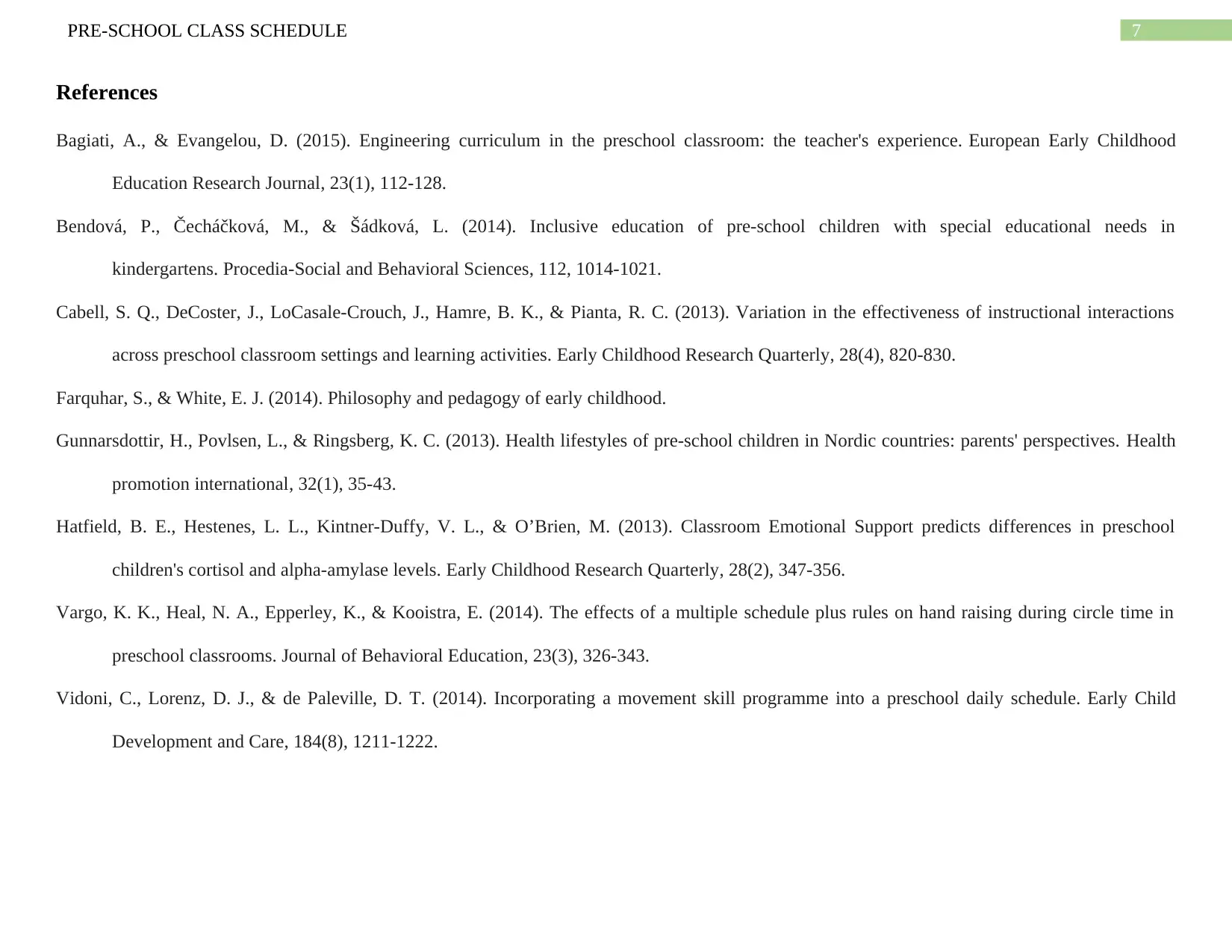
7PRE-SCHOOL CLASS SCHEDULE
References
Bagiati, A., & Evangelou, D. (2015). Engineering curriculum in the preschool classroom: the teacher's experience. European Early Childhood
Education Research Journal, 23(1), 112-128.
Bendová, P., Čecháčková, M., & Šádková, L. (2014). Inclusive education of pre-school children with special educational needs in
kindergartens. Procedia-Social and Behavioral Sciences, 112, 1014-1021.
Cabell, S. Q., DeCoster, J., LoCasale-Crouch, J., Hamre, B. K., & Pianta, R. C. (2013). Variation in the effectiveness of instructional interactions
across preschool classroom settings and learning activities. Early Childhood Research Quarterly, 28(4), 820-830.
Farquhar, S., & White, E. J. (2014). Philosophy and pedagogy of early childhood.
Gunnarsdottir, H., Povlsen, L., & Ringsberg, K. C. (2013). Health lifestyles of pre-school children in Nordic countries: parents' perspectives. Health
promotion international, 32(1), 35-43.
Hatfield, B. E., Hestenes, L. L., Kintner-Duffy, V. L., & O’Brien, M. (2013). Classroom Emotional Support predicts differences in preschool
children's cortisol and alpha-amylase levels. Early Childhood Research Quarterly, 28(2), 347-356.
Vargo, K. K., Heal, N. A., Epperley, K., & Kooistra, E. (2014). The effects of a multiple schedule plus rules on hand raising during circle time in
preschool classrooms. Journal of Behavioral Education, 23(3), 326-343.
Vidoni, C., Lorenz, D. J., & de Paleville, D. T. (2014). Incorporating a movement skill programme into a preschool daily schedule. Early Child
Development and Care, 184(8), 1211-1222.
References
Bagiati, A., & Evangelou, D. (2015). Engineering curriculum in the preschool classroom: the teacher's experience. European Early Childhood
Education Research Journal, 23(1), 112-128.
Bendová, P., Čecháčková, M., & Šádková, L. (2014). Inclusive education of pre-school children with special educational needs in
kindergartens. Procedia-Social and Behavioral Sciences, 112, 1014-1021.
Cabell, S. Q., DeCoster, J., LoCasale-Crouch, J., Hamre, B. K., & Pianta, R. C. (2013). Variation in the effectiveness of instructional interactions
across preschool classroom settings and learning activities. Early Childhood Research Quarterly, 28(4), 820-830.
Farquhar, S., & White, E. J. (2014). Philosophy and pedagogy of early childhood.
Gunnarsdottir, H., Povlsen, L., & Ringsberg, K. C. (2013). Health lifestyles of pre-school children in Nordic countries: parents' perspectives. Health
promotion international, 32(1), 35-43.
Hatfield, B. E., Hestenes, L. L., Kintner-Duffy, V. L., & O’Brien, M. (2013). Classroom Emotional Support predicts differences in preschool
children's cortisol and alpha-amylase levels. Early Childhood Research Quarterly, 28(2), 347-356.
Vargo, K. K., Heal, N. A., Epperley, K., & Kooistra, E. (2014). The effects of a multiple schedule plus rules on hand raising during circle time in
preschool classrooms. Journal of Behavioral Education, 23(3), 326-343.
Vidoni, C., Lorenz, D. J., & de Paleville, D. T. (2014). Incorporating a movement skill programme into a preschool daily schedule. Early Child
Development and Care, 184(8), 1211-1222.
1 out of 8
Your All-in-One AI-Powered Toolkit for Academic Success.
+13062052269
info@desklib.com
Available 24*7 on WhatsApp / Email
![[object Object]](/_next/static/media/star-bottom.7253800d.svg)
Unlock your academic potential
© 2024 | Zucol Services PVT LTD | All rights reserved.